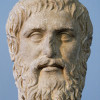“ A house that is divided against itself cannot stand; two men who quarrel detract from one another's strength, and he who is at war with himself is the enemy of himself and the gods. Not wickedness therefore, but semi-wickedness flourishes in states,—a remnant of good is needed in order to make union in action possible,—there is no kingdom of evil in this world. ”
Plato, The Republic. copy citation
| Author | Plato |
|---|---|
| Source | The Republic |
| Topic | strength action |
| Date | |
| Language | English |
| Reference | |
| Note | Translated by Benjamin Jowett |
| Weblink | http://www.gutenberg.org/files/1497/1497-h/1497-h.htm |
Context
“the latter is at first churlish, but in the judicious hands of Socrates is soon restored to good-humour: Is there not honour among thieves? Is not the strength of injustice only a remnant of justice? Is not absolute injustice absolute weakness also? A house that is divided against itself cannot stand; two men who quarrel detract from one another's strength, and he who is at war with himself is the enemy of himself and the gods. Not wickedness therefore, but semi-wickedness flourishes in states,—a remnant of good is needed in order to make union in action possible,—there is no kingdom of evil in this world.
Another question has not been answered: Is the just or the unjust the happier? To this we reply, that every art has an end and an excellence or virtue by which the end is accomplished. And is not the end of the soul happiness, and justice the excellence of the soul by which happiness is attained?”
source


